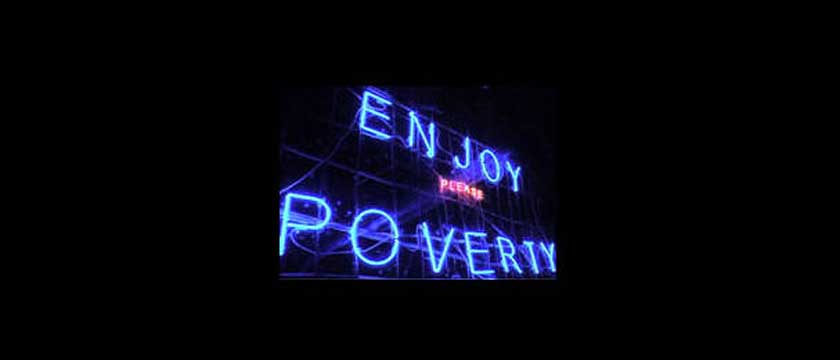Wednesday May 24 at 6PM, screening of Episode 3: Enjoy Poverty by Renzo Martens + panel discussion with Bmike, Big Chief Brian Harrison Nelson, Garrett Bradley and Kristina Kay Robinson, at the Joan Mitchell Center, 2275 Bayou Road.

Episode 3: Enjoy Poverty is a controversial 90 minute film registration of Renzo Martens’ activities in the Congo. In an epic journey, the film establishes that images of poverty are the Congo’s most lucrative export, generating more revenue than traditional exports like gold, diamonds, or cocoa. However, just as with these traditional exports, those that provide the raw material: the poor being filmed, hardly benefit from it at all.
We, a Dutch non-profit operating in New Orleans, constantly ask ourselves the question of how to share our resources in a way that makes sense as much for New Orleans as it does for us. We’ve invited a number of people who somehow deal with this question in their practice to discuss the film and its thematics after the screening.
Renzo Martens is a Dutch artist who currently lives and works in Brussels, Amsterdam and Kinshasa. In 2010 he initiated the Institute for Human Activities (IHA) that postulates a gentrification program in the Congolese rainforest.
Panelists:
Brandan “Bmike” Odums is a highly sought after visual artist and filmmaker who uses these chosen mediums to tell stories and make statements that transform the minds of viewers as well as the spaces in which his work appears.
Brian Harrison Nelson is the Big Chief of the Guardians of the Flame. He studied at the University of Southern California School of Cinematic Arts. He wrote and directed the short film Keeper of the Flame.
Garrett Bradley was educated in film at UCLA. She focuses on social economic situations, human conflicts and historical reflection and won several prizes, including the Artadia New Orleans Prospect Award and the Sundance Jury Award.
Kristina Kay Robinson is a writer and visual artist born and raised in New Orleans, Louisiana. Her written and visual work centers the intellectual geographies and spiritual technologies of Black, Afro-Indigenous, and diasporic peoples.
